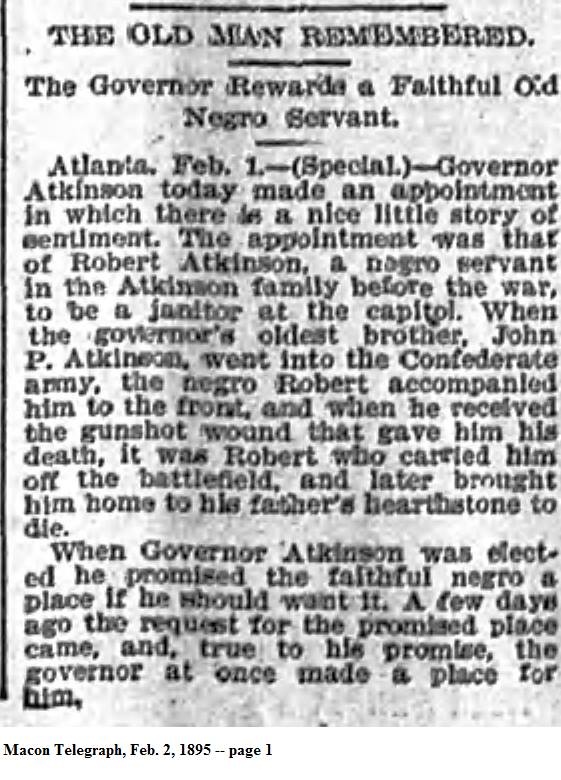 Here is a wonderful example of how the role of the loyal camp slave during the Civil War served to define and reinforce race relations decades later. In February 1895, Governor William Y. Atkinson appointed Robert Atkinson to the position of janitor at the state capitol in Atlanta, Georgia.
Here is a wonderful example of how the role of the loyal camp slave during the Civil War served to define and reinforce race relations decades later. In February 1895, Governor William Y. Atkinson appointed Robert Atkinson to the position of janitor at the state capitol in Atlanta, Georgia.
The appointment was an acknowledgment of Robert’s role as the camp slave or “body servant” to the governor’s younger brother. Robert accompanied John P. Atkinson and following his wounding, “carried him off the battlefield, and later brought him home to his father’s hearthstone to die.” Accounts of slaves escorting their dead or wounded masters home litter postwar accounts and provide for white southerners the clearest evidence of faithful service.
The appointment also provided an opportunity for Governor Atkinson to outline the kind of behavior he expected from Georgia’s black population, especially those who expected any kind of support from the state government. It is very likely that Robert’s request was accompanied by a clear demonstration of his continued loyalty to the family and an acknowledgment of his place in the racial hierarchy.
I’m a bit confused. Nothing I read here is clearly false, but wasn’t Atkinson anti-lynching and pro-civil rights, especially compared to his predecessor, Clement Evans. And I think that janitor was a more respectable position then than now; when I read old newspapers I often read about janitorial appointments and such. Also, giving state positions to black constituents was a common type of patronage meant to improve a politician’s black vote share. The tone of the post and the previous comment seem to imply a very different nature of the relationship between the two Atkinsons. Certainly Robert was denied much that he should have had the right to during his life, and I imagine William’s ideas about race would not look good today, but this looks like a normal example of a newly elected late 1800s governor giving a position to a family friend with an eye to personal political gain as well.
Hi Shane,
I can’t speak to the nature of the relationship given the evidence provided. What I can speak to is the way in which this appointment was reported to the general public. This is something that I am going to follow up on given the prominence of the Atkinson family. Perhaps I will find something that helps me to better understand how Robert Atkinson understood the relationship and his appointment.
Thank you for your reply. That makes more sense, now.
Good example of paternalism and the rewards of Tomism.
Paternalism, Yes.
Tomism, maybe. The position of African Americans was quite precarious in 1895 and would only get worse over the next few decades as Jim Crow became the established law and custom of the South. Robert, being anywhere from 50-?, may have actively cultivated this relationship for his own survival and perhaps even gain. The sadness of these stories is that they are very one sided. More research may uncover Roberts role in the black community and his activities following the war during Reconstruction. His Tomism may be a role he plays at the governors’ mansion while saving money for his children’s education at one of the many burgeoning black colleges.
Robert, being anywhere from 50-?, may have actively cultivated this relationship for his own survival and perhaps even gain.
That is very likely given what I am finding about former camp slaves who go out of their way to play specific roles at Confederate veterans reunions.